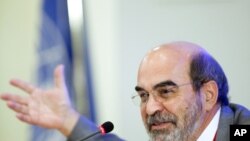The U.N. Food and Agriculture Organization is urging countries to follow Vietnam’s example in boosting agricultural production to combat food shortages that can lead to political instability.
Praise
The head of the U.N. Food and Agriculture Organization, Jose Graziano da Silva, praised Vietnam’s agricultural policies for combating local hunger and increasing its exports in a region that has long battled chronic hunger.
"Vietnam is one of the few countries in the world that has been increasing exports and also assuring food security locally, and this is crucial for political stability and also for peace," he said.
The Asia Pacific is home to more than 60 percent of the world's people suffering from hunger and malnutrition. The FAO regional conference is focusing on finding sustainable ways to increase production in the face of rising food prices.
Food insecurity
Retail rice prices in Asia are 10 to 30 percent higher than at this time last year. Director da Silva warns the prices could fuel social unrest.
"We have seen in a lot of countries, but especially in Arab countries, in Africa, that there is a growing relationship between conflict and food insecurity," he said. "When people do not have food security assured by the government, when they don’t have reasonable price for their food basket, conflict emerges."
Deficit to surplus
Vietnam has grown from a country of food deficiency 30 years ago to the world’s second largest rice exporter after Thailand. Last year the country exported 7.2 million tons of rice.
The FAO’s Asia director, Hiroyuki Konuma, attributed the country’s success to investments in agricultural research, and urged other countries to take heed.
"Vietnam’s agriculture productivity growth has been very remarkable in the past decade," he said. "Rice productivity growth has been outstanding. This is one of the evidence on government policy that put an emphasis on agricultural production growth, particularly in the area of agricultural research."
Konuma said the global population is expected to grow by another 1 billion people by 2050, which means there is very little potential to expand agricultural land, especially in Asia. That is why, he said, food production depends on increased yields.
Research is key
The FAO estimates that between now and 2050, 91 percent of the growth in food production will come from higher yields. He said research is the key, and his organization is working with other countries, including North Korea, to improve production.
"We have been putting a lot of effort in the DPRK, North Korea, we have just started a program. For example if North Korea can increase productivity by one ton per hectare, then it will actually solve food shortage," he said.
During the news conference, Konuma also said a new strain of bird flu affecting countries in the region is now under control. Recent deaths from H5N1 in Vietnam were caused by the old strain, which has a vaccine.
Graziano da Silva took over as FAO director-general in January. He said sustainable increases in agricultural production and a "fairer and more inclusive" global food system are needed if the world is to address global hunger.
The one-week conference is set to wrap up Friday.




